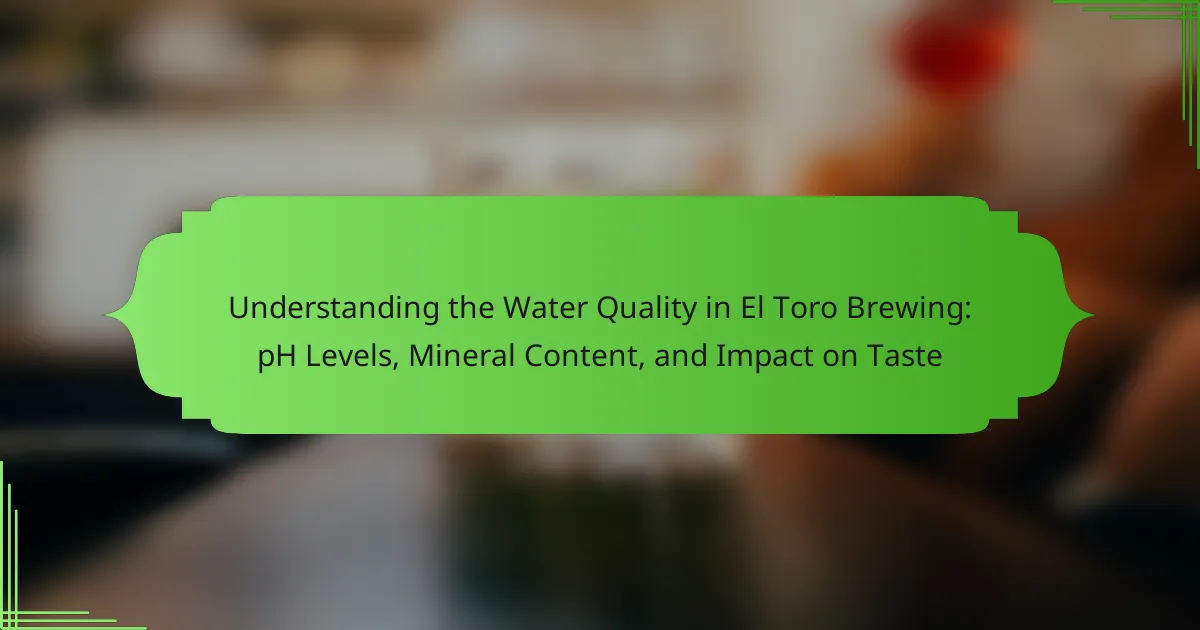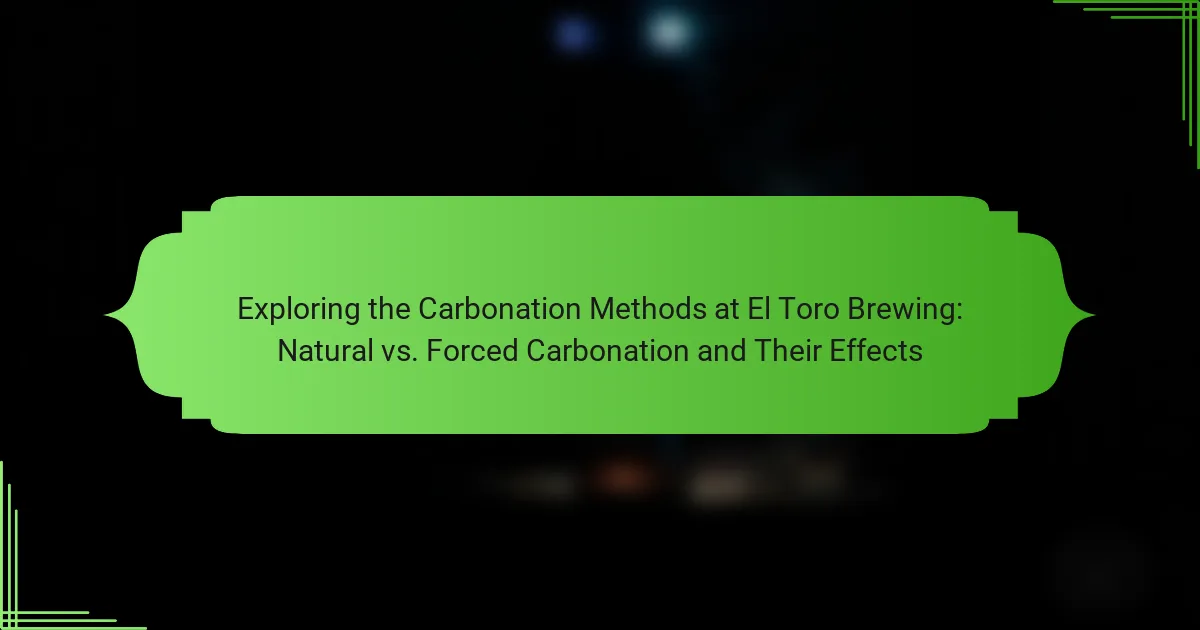Water quality is a critical factor in brewing, influencing the flavor and characteristics of the final beer product. The article examines the specific pH levels and mineral content of El Toro Brewing’s water, highlighting how these elements affect taste and fermentation efficiency. It details the importance of maintaining a pH range of approximately 7.2 to 7.5, which is ideal for flavor extraction. Additionally, the article discusses the roles of minerals such as calcium, magnesium, and sulfate in shaping the beer’s flavor profile, while cautioning against excessive sodium levels that may lead to undesirable tastes. Understanding these aspects of water quality is essential for brewers aiming to achieve consistency and enhance the overall quality of their beer.

What is the significance of water quality in brewing?
Water quality is crucial in brewing as it directly affects the flavor and characteristics of the final product. The mineral content influences the taste profile of the beer. Specific minerals, such as calcium and magnesium, enhance yeast activity and fermentation efficiency. Additionally, the pH level of water impacts enzyme activity during the mashing process. Water that is too hard or too soft can lead to undesirable flavors. A study by the American Society of Brewing Chemists emphasizes that optimal water quality can improve the overall quality of beer. Therefore, brewers must carefully monitor and adjust water quality to achieve the desired taste and consistency.
How do pH levels influence brewing processes?
pH levels significantly influence brewing processes by affecting enzyme activity and flavor extraction. An optimal pH range for brewing is typically between 5.2 and 5.6. Within this range, enzymes like amylase work efficiently to convert starches into sugars. If the pH is too low, below 5.0, it can lead to excessive acidity, which may inhibit yeast activity. Conversely, a high pH, above 6.0, can result in poor extraction of flavors and aromas from the malt. Research shows that pH levels also impact the solubility of minerals, which can alter the beer’s taste profile. Maintaining the correct pH throughout the brewing stages is crucial for achieving the desired flavor and quality in the final product.
What is the ideal pH range for brewing beer?
The ideal pH range for brewing beer is between 5.2 and 5.6. This pH level promotes optimal enzyme activity during mashing. It also helps achieve the desired flavor profile. A pH below 5.2 can lead to sour flavors. Conversely, a pH above 5.6 may result in astringency. Maintaining this range ensures proper extraction of sugars and flavors. Studies have shown that pH directly influences the efficiency of the brewing process. Thus, controlling pH is crucial for quality beer production.
How does pH affect fermentation and flavor?
pH significantly affects fermentation and flavor in brewing. The pH level influences yeast activity and metabolic processes. Optimal pH for fermentation typically ranges from 4.0 to 5.0. Within this range, yeast can efficiently convert sugars into alcohol and carbon dioxide. A lower pH can enhance the production of certain flavor compounds. Conversely, a higher pH may lead to off-flavors and inhibit yeast performance. Studies show that pH impacts the solubility of minerals, which in turn affects flavor profile. For instance, higher acidity can enhance hop bitterness and aroma. Therefore, managing pH is crucial for achieving desired fermentation outcomes and flavor characteristics in brewing.
What role does mineral content play in brewing?
Mineral content plays a crucial role in brewing by influencing the flavor, mouthfeel, and stability of beer. Different minerals affect various aspects of the brewing process. For example, calcium enhances enzyme activity and yeast health. Magnesium contributes to a smooth mouthfeel and can affect bitterness perception. Sulfates can accentuate hop bitterness, while chlorides enhance malt sweetness. The overall mineral balance in water can significantly impact the final taste profile of the beer. Research shows that the optimal mineral composition varies depending on the beer style being brewed. For instance, pale ales benefit from higher sulfate levels, while stouts often require more chloride.
Which minerals are essential for brewing quality beer?
Calcium, magnesium, and sulfate are essential minerals for brewing quality beer. Calcium contributes to enzyme activity and helps with yeast health. Magnesium is crucial for yeast metabolism and fermentation processes. Sulfate enhances hop bitterness and balances sweetness. Chloride adds fullness and sweetness to the beer. These minerals influence flavor, mouthfeel, and overall beer quality. Proper mineral balance is vital for achieving desired beer characteristics.
How do different minerals affect taste and mouthfeel?
Different minerals significantly influence taste and mouthfeel in beverages. Minerals such as calcium enhance mouthfeel by providing a creamy texture. Magnesium contributes to a slightly bitter taste, which can balance sweetness. Sodium can amplify the perception of sweetness while also adding a savory note.
Chloride enhances smoothness and fullness in taste. Sulfates can impart a dry, crisp sensation, often perceived in certain beer styles. The balance of these minerals affects overall flavor complexity. For instance, higher sulfate levels may emphasize hop bitterness.
Research shows that the mineral composition of water used in brewing directly impacts flavor profiles. A study by the American Society of Brewing Chemists highlights how specific mineral ratios can alter sensory perceptions in beer.

What specific pH levels are found in El Toro Brewing’s water?
The specific pH levels found in El Toro Brewing’s water are approximately 7.2 to 7.5. This range indicates that the water is neutral to slightly alkaline. Such pH levels are suitable for brewing processes. They help in achieving optimal flavor extraction from the ingredients. Maintaining this pH range is essential for the brewing quality. It ensures consistency in the final product. The water’s pH contributes to the overall taste profile of the beer.
How does El Toro Brewing measure pH levels?
El Toro Brewing measures pH levels using a calibrated pH meter. This device provides precise readings of the acidity or alkalinity of their water. The brewing process requires specific pH levels for optimal flavor extraction. Regular calibration ensures accuracy in measurements. They typically measure pH at various stages of brewing. These measurements help maintain consistency in beer quality. Monitoring pH levels is crucial for achieving desired taste profiles. Accurate pH measurement supports the overall quality of their brews.
What tools and techniques are used for pH measurement?
pH measurement tools include pH meters, litmus paper, and pH indicator solutions. pH meters are electronic devices that provide precise pH readings. They consist of a glass electrode and a reference electrode. Litmus paper changes color based on acidity or alkalinity. It offers a quick, qualitative assessment of pH levels. pH indicator solutions change color in response to pH changes. They provide a visual method for estimating pH. These tools are essential in various applications, including brewing, where pH affects flavor and quality. Accurate pH measurement is crucial for maintaining consistency in brewing processes.
How frequently are pH levels tested at El Toro Brewing?
pH levels at El Toro Brewing are tested daily. Regular testing ensures consistent water quality. This practice helps maintain optimal brewing conditions. The daily frequency allows for immediate adjustments if necessary. Consistent monitoring supports the brewing process and enhances flavor profiles.
What variations in pH levels can be observed throughout the brewing process?
pH levels vary significantly throughout the brewing process. Initially, the pH of the water used can range from 6.5 to 8.5. During mashing, the pH typically drops to around 5.2 to 5.6. This decrease is due to the extraction of acids from the malt. Boiling the wort can further reduce the pH to about 5.0 to 5.4. This is influenced by the addition of hops and the evaporation of volatile compounds. After fermentation, the pH may stabilize between 4.0 and 4.5. This final pH is crucial for flavor and stability. Each stage of brewing impacts the pH, affecting the overall quality of the beer.
How does the pH change during mashing and boiling?
During mashing, the pH typically decreases from around 5.5 to 5.2. This change occurs due to the enzymatic breakdown of starches and the release of organic acids. The presence of these acids lowers the pH, creating an optimal environment for enzyme activity.
During boiling, the pH can increase slightly, often reaching around 5.4 to 5.6. This is due to the evaporation of volatile acids and the precipitation of certain compounds. The boiling process helps stabilize the pH, which is crucial for flavor and clarity in the final product.
These pH changes are essential for achieving desired flavors and characteristics in the beer. The optimal pH levels during both processes enhance enzyme efficiency and overall brewing quality.
What impact does pH variation have on the final product?
pH variation significantly affects the final product in brewing. It influences the extraction of flavors, aromas, and bitterness from ingredients. For instance, a lower pH can enhance hop bitterness and reduce astringency. Conversely, higher pH levels may lead to a more bitter and less balanced taste. Additionally, pH affects yeast activity during fermentation. Optimal pH levels promote healthy yeast growth and fermentation efficiency. Research indicates that maintaining a pH range of 5.2 to 5.6 is ideal for most beers. Deviations outside this range can result in off-flavors and inconsistent product quality.

How does the mineral content of El Toro Brewing’s water affect taste?
The mineral content of El Toro Brewing’s water significantly influences its taste. Minerals such as calcium, magnesium, and sulfate contribute to the flavor profile of the beer. Higher calcium levels enhance the mouthfeel and body of the beer. Magnesium can impart a slight bitterness, which can balance sweetness. Sulfates can accentuate hop flavors, making them more pronounced. Conversely, excessive sodium can lead to a salty taste, which is undesirable. The specific balance of these minerals creates a unique taste experience for each brew. Water chemistry is a critical factor in brewing, as it affects fermentation and overall flavor.
What minerals are present in El Toro Brewing’s water supply?
It is not possible to provide specific information about the minerals present in El Toro Brewing’s water supply. The mineral content can vary based on the source and treatment of the water. Detailed analysis or reports from El Toro Brewing would be required for accurate data.
How do specific minerals contribute to the flavor profile of different beers?
Specific minerals significantly influence the flavor profile of different beers. Minerals such as calcium, magnesium, sulfate, and chloride play crucial roles in brewing. Calcium enhances yeast activity and promotes flocculation, leading to a cleaner taste. Magnesium contributes to the overall mouthfeel and can add a slight bitterness. Sulfate accentuates hop bitterness, making IPAs more pronounced. Chloride, on the other hand, softens the bitterness and enhances the sweetness of malt. The balance of these minerals affects the beer’s body, mouthfeel, and overall flavor complexity. For instance, water high in sulfate is ideal for pale ales, while water rich in chloride benefits stouts and porters.
What is the relationship between mineral content and beer style?
Mineral content significantly influences beer style. Different minerals affect flavor, mouthfeel, and overall character. For instance, high sulfate levels enhance hop bitterness, common in IPAs. Conversely, higher chloride levels promote malt sweetness, typical in stouts. Calcium contributes to enzyme activity during mashing, impacting fermentation efficiency. Magnesium supports yeast health, which is crucial for all beer styles. Each beer style often has a preferred mineral profile, guiding brewers in water treatment. Research indicates that specific water profiles are historically linked to regional beer styles, such as Burton-on-Trent’s sulfate-rich waters for pale ales.
What techniques does El Toro Brewing use to optimize water quality?
El Toro Brewing uses several techniques to optimize water quality. They conduct regular water testing to monitor pH levels and mineral content. This helps ensure the water meets brewing standards. They implement filtration systems to remove impurities. Additionally, they adjust mineral profiles to enhance flavor. Their brewing process includes temperature control to maintain optimal conditions. These methods collectively improve the overall quality of the water used in brewing.
How does water treatment influence brewing outcomes?
Water treatment significantly influences brewing outcomes by altering the chemical composition of water used in the process. Different minerals in water, such as calcium and magnesium, affect enzyme activity during mashing. This can enhance or inhibit the extraction of sugars from malt. The pH level of water also plays a crucial role. An optimal pH range, typically between 5.2 and 5.6, ensures better flavor development and stability.
Moreover, treated water can remove undesirable compounds, improving the overall taste profile of the brew. For example, chlorine and chloramines can impart off-flavors. Effective water treatment can neutralize these compounds, leading to a cleaner taste. Studies have shown that specific mineral profiles can enhance beer styles, such as higher sulfate levels for hoppy beers and higher chloride levels for malt-forward styles.
What best practices can be adopted for maintaining ideal water quality in brewing?
Maintaining ideal water quality in brewing involves several best practices. First, regularly test water for pH and mineral content. Ideal pH levels for brewing range from 5.2 to 5.6. Adjustments can be made using food-grade acids or bases. Second, ensure water is filtered to remove impurities. This prevents off-flavors and unwanted compounds. Third, monitor water temperature during brewing. Consistent temperatures enhance extraction and flavor development. Fourth, maintain proper sanitation of brewing equipment. This reduces contamination risks. Fifth, source water quality should be considered. Use water that complements the style of beer being brewed. Following these practices leads to better tasting beer.
The main entity of this article is El Toro Brewing, focusing on the significance of water quality in brewing, particularly regarding pH levels and mineral content. The article outlines how water quality directly impacts the flavor and characteristics of beer, emphasizing the importance of maintaining optimal pH levels and mineral balance. It details specific pH ranges ideal for brewing processes, the role of essential minerals such as calcium and magnesium, and how variations in these factors affect fermentation and taste. Additionally, the article discusses the techniques employed by El Toro Brewing to ensure consistent water quality for superior beer production.


